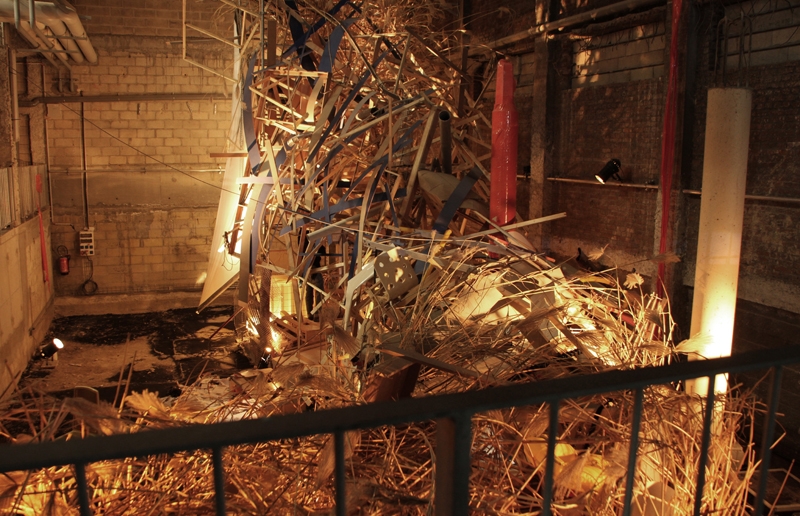Interviewed by Blouin Artinfo France on the occasion of the unveiling, in 2012, of Bordel Monstre, his monumental, sprawling installation made up of debris in Paris’s Palais de Tokyo, Delhi-based artist Asim Waqif (who was born in Hyderabad) was asked to name ‘the most indispensable item in your studio’. He gave the following answer: ‘Knives and blades. I have a lot of different tools for each artwork idea.’ As it so happens, I was fortunate enough to meet the artist in his studio in an improbably dusty backstreet of Tughlakabad, a suburb of the Indian capital (Waqif enjoys keeping a healthy distance from the artworld), where I was shown said collection of knives and blades – not part of the regular studio-visit routine, this was a somewhat frightening sight.
Known for his elaborate, crudely interactive site-specific installations that often involve labyrinthine weavings of bamboo, Waqif was originally trained as an architect, and the peculiar predicaments of South Asian urbanism clearly continue to shape much of his seemingly Luddite material thinking – questions concerning housing and provisional, precarious living, habitation and homelessness. Most significantly, however, his signature recycling of various waste materials directly addresses the catastrophic ecological crises set off by the economic boom that has so thoroughly transformed the Indian built environment. Underneath the artist’s disregard for artworld decorum (‘the weirdest thing in most museums and galleries is that you’re not allowed to touch most of the art’) lies an all-the-more urgently felt moral core – here is an artist from whom a city, a country, a world can learn a thing or two.
After training as an architect and working in film, Hyderabad-born Asim Waqif has evolved an art practice that engages with city structures, dereliction and precarity, inspired by and often built into the city of Delhi. His monumental – often trash-based – installations have recently been constructed at Palais de Tokyo, Paris; Nature Morte, Delhi; the Marrakech Biennale; and Dhaka Art Summit. Selected by Dieter Roelstraete, member of the curatorial team of Documenta 14, Kassel.
Read all of our 2015 FutureGreats profiles
This article was first published in the March 2015 issue.
